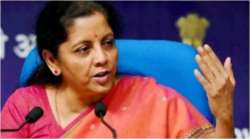G20 Action Plan expression of collective commitment to fight COVID-19: FM
Finance Minister Nirmala Sitharaman on Saturday said the G20 Action Plan is an expression of collective commitment to fight COVID-19 pandemic and it should remain relevant and effective as the crisis evolves.

Finance Minister Nirmala Sitharaman on Saturday said the G20 Action Plan is an expression of collective commitment to fight COVID-19 pandemic and it should remain relevant and effective as the crisis evolves.
Participating in the third Meeting of G20 Finance Ministers and Central Bank Governors via video conference, Sitharaman shared with G-20 India’s success in using technology-based financial inclusion to make contactless transfers of USD 10 billion to 420 million bank accounts.
"Smt. @nsitharaman said #G20 Action Plan is an expression of our collective commitment to fight #COVID19 and it must remain relevant and effective as the crisis evolves," the Finance Ministry said in a tweet.
The G20 finance ministers and central bank governors in April published an Action Plan for the international response to the COVID-19 pandemic.
The Action Plan covers the healthcare, economic and fiscal responses that G20 members have agreed to undertake, as well as measures to ensure a return to a strong and sustainable global economy, the provision of support to countries in need and the learning of lessons in preparation for future crises.
Meanwhile, RBI Governor Shaktikanta Das said, "Participated in virtual meeting of G20 Finance Ministers and Central Bank Governors today. Focused on macroeconomy, capital flows, cross border payments, transition from LIBOR and other issues."
"Finance Minister Smt. @nsitharaman shared in G20 meeting, policy measures undertaken by India to provide support during the pandemic with a comprehensive package of over USD 295 Billion, about 10% of India’s GDP," the ministry said in another tweet.
To deal with the coronavirus crisis, India announced one of the world's biggest stimulus packages worth Rs 20.97 lakh crore with a focus on the survival of the business and setting a roadmap for the revival of the economy.
The five-part stimulus package announced by the Finance Minister beginning May 13 comprised Rs 5.94 lakh crore in the first tranche that provided credit line to small businesses and support to shadow banks and electricity distribution companies.
The second tranche included free foodgrain to stranded migrant workers for two months and credit to farmers, totalling Rs 3.10 lakh crore. Spending on agri infrastructure and other measures for agriculture and allied sectors in the third tranche totalled to Rs 1.5 lakh crore.
The fourth and fifth tranches that dealt mostly with structural reforms including relaxation of foreign direct investment (FDI) limit in defence, privatisation of six more airports, and fully opening up coal mining to the private sector.